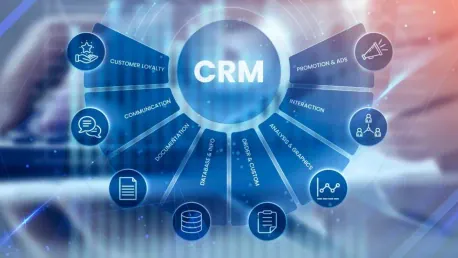The competitive landscape of the manufacturing sector has evolved significantly over the past few years. With an increasing number of players in the market, manufacturers are focusing more than ever on enhancing their customer service operations to gain a competitive edge. Implementing Customer Relationship Management (CRM) software is becoming an essential strategy to achieve this goal, leading to improved client satisfaction and loyalty. The ability to maintain robust customer relationships is particularly crucial in manufacturing, where the sales cycle is often prolonged and multifaceted, involving a multitude of stakeholders and decision-makers. CRM systems enable manufacturers to streamline, personalize, and elevate customer interactions, transforming customer service from a transactional function into a pivotal element of business strategy.
As customer expectations for seamless and proactive service continue to rise, the role of CRM software in manufacturing becomes indispensable. Beyond traditional task management, modern CRM systems integrate AI capabilities and automation to enhance service quality and operational efficiency. This integration offers a holistic approach to customer relationship management, encompassing everything from initial contact and sales to post-sales services. The following sections delve into the rising importance of customer service in manufacturing, how CRM software unifies customer data, the role of automation and AI, real-world success stories, data-driven decision-making, and the benefits of streamlined operations through CRM implementation.
The Rising Importance of Customer Service in Manufacturing
Customer service has taken on a critical role in the manufacturing sector, differentiated by its potential to impact the entire customer experience (CX). Unlike traditional retail environments where sales cycles may be quicker and less complex, manufacturing often entails lengthy processes with numerous touchpoints. Ensuring a seamless and supportive customer journey from initial contact through post-sales services is increasingly seen as a differentiator in a crowded marketplace. This focus on customer service not only converts more leads into customers but also fosters long-term relationships.
Post-sales services provide numerous revenue-generating opportunities, including product maintenance, training, and upgrades. Manufacturers who excel at customer service can capture these opportunities, thereby strengthening customer loyalty and enhancing revenue streams. Exceptional customer service translates to more than just addressing inquiries and resolving issues; it’s about building enduring relationships that encourage repeat business and brand advocacy. For manufacturers aiming to stand out, prioritizing high-quality customer service underscores their commitment to customer satisfaction and builds a strong foundation for future growth.
Moreover, the manufacturing industry is witnessing rapid advancements in technology and increasing competition, compelling companies to differentiate themselves through superior customer service. The drive for higher efficiency and productivity has augmented the need for innovative solutions like CRM systems, which enable a comprehensive and personalized approach to customer service. By leveraging these systems, manufacturers can navigate the complexities of customer interactions, ensuring a consistent and positive experience at every touchpoint.
Leveraging CRM for Unified Customer Data
A significant challenge many manufacturers face in delivering exceptional customer service is fragmented customer data spread across various systems and departments. CRM software addresses this critical issue by consolidating all customer information into a single, unified database. This holistic view is accessible to relevant teams, providing a centralized source of truth that enhances inter-departmental collaboration and operational efficiency. With a unified customer database, service representatives can quickly pull up comprehensive profiles that include all past interactions, purchase history, and preferences, enabling more personalized and effective communication.
The importance of having a unified view of the customer cannot be overstated. Inconsistencies and gaps in customer data can lead to misunderstandings, miscommunication, and ultimately, customer dissatisfaction. A CRM system ensures all teams work with the same set of information, reducing the likelihood of errors and enhancing the customer experience. For example, marketing teams can tailor campaigns to specific customer segments, sales teams can identify high-value leads, and support teams can respond more effectively to service requests, all based on a consistent and accurate data set.
Beyond data consolidation, CRM systems facilitate the alignment between marketing, sales, and customer service teams. This alignment ensures that every team member operates with the same information, fostering a more collaborative and less siloed working environment. The ability to access a single, comprehensive view of the customer allows each department to function more cohesively, thereby improving efficiency across the board and enhancing the overall customer experience.
Automation and AI in CRM Systems
The integration of AI and automation within CRM systems is revolutionizing customer service in the manufacturing sector. These technologies automate repetitive tasks such as email responses, chat interactions, and ticket management, freeing up human agents to focus on more complex issues that require a personal touch. Automation ensures that routine, time-consuming tasks are handled efficiently, allowing human resources to be allocated to higher-value activities that enhance customer satisfaction.
AI-driven chatbots, for instance, can manage routine inquiries around the clock, providing immediate responses and significant time savings. These bots can handle a wide array of standard customer questions and issues, escalating only the more complex or nuanced problems to human agents. This approach ensures that customers receive quick solutions whenever possible while more challenging tasks receive the attention they require. By incorporating AI, CRM systems not only improve efficiency but also ensure that customer inquiries are handled promptly and accurately, which is crucial for maintaining high service standards.
Moreover, automation capabilities within CRM systems can streamline processes such as follow-ups and reminders, ensuring no customer request falls through the cracks. Automated workflows can track the progress of customer interactions, sending timely reminders to service representatives for follow-ups and necessary actions. This level of efficiency elevates both service quality and operational productivity, enabling manufacturers to serve customers more effectively and build stronger relationships.
Real-world Success Stories
Several manufacturers have successfully implemented CRM systems to enhance their customer service and achieve significant results. One notable example is Fisher & Paykel, a company that leveraged CRM software to unify their customer data, thereby addressing issues stemming from fragmented customer views. The implementation of an AI chatbot to handle routine queries significantly improved their service quality, as it allowed human agents to focus on more complex customer needs. This dual approach of data unification and AI integration enabled Fisher & Paykel to transform their customer service operations, enhancing both efficiency and customer satisfaction.
Another inspiring case is Fantini Rubinetti, which utilized CRM to streamline their marketing, sales, and support processes. By fostering better inter-departmental collaboration through a cohesive CRM implementation, Fantini Rubinetti could enhance productivity and deliver superior customer service. This integrated approach not only improved internal coordination but also resulted in heightened customer satisfaction, exemplifying how CRM systems can drive operational excellence and customer loyalty.
WORX represents another compelling example of CRM success. The company integrated its CRM system with Customer Satisfaction (CSAT) software, managing and analyzing customer satisfaction surveys to gain valuable insights. This integration provided WORX with robust tools to measure and improve service levels, as well as predict customer loyalty trends. By leveraging CRM for data-driven customer service strategies, WORX was able to make informed decisions that significantly enhanced their customer service operations.
Data-Driven Decisions for Superior Customer Service
One of the most powerful capabilities of modern CRM systems is their ability to provide manufacturers with the tools needed to make informed, data-driven decisions aimed at enhancing customer service. Integrated analytics tools within CRM systems evaluate vast amounts of customer data to identify patterns, preferences, and potential service bottlenecks. These analytics provide actionable insights that empower manufacturers to tailor their interactions and services to meet specific customer needs.
Predictive analytics, a pivotal feature of advanced CRM systems, can forecast future customer behaviors, allowing manufacturers to proactively address potential issues before they escalate. By anticipating customer needs and preferences, manufacturers can design service strategies that are both responsive and preemptive, significantly improving customer satisfaction and loyalty. The use of these analytics tools transforms raw customer data into valuable insights, facilitating a more personalized and effective approach to customer service.
Moreover, continuous improvement in service operations is achievable through advanced data analysis provided by CRM systems. By regularly evaluating customer feedback, satisfaction scores, and service efficiency metrics, manufacturers can identify areas for improvement and implement necessary changes. This iterative process ensures that service levels continually meet or exceed customer expectations, fostering a culture of excellence within the organization. Through data-driven decision-making, manufacturers not only enhance their customer service but also maintain a competitive edge in an ever-evolving market landscape.
Streamlined Operations through CRM Implementation
Implementing a CRM system offers substantial benefits beyond customer service improvements; it also streamlines internal operations across manufacturing organizations. By automating routine tasks and providing a centralized data repository, CRM systems reduce manual workload, minimize errors, and improve coordination among departments. This enhanced operational efficiency is crucial for speeding up service response times and ensuring consistency in customer interactions.
Standardized processes enabled by CRM systems foster a professional and reliable service image, which is vital for building customer trust. Features such as task automation, real-time data updates, and mobile accessibility empower service teams to be more agile and responsive to customer needs. The ability to quickly adapt to changing customer demands and market conditions drives overall business growth and enhances customer loyalty.
Moreover, CRM implementation supports better resource allocation and task management. Automated workflows help ensure that service representatives are optimally utilized, handling high-priority tasks while routine activities are managed by the system. This strategic allocation of resources not only boosts operational productivity but also allows manufacturers to offer a higher quality of service. As a result, CRM systems play a pivotal role in streamlining operations, fostering a more efficient, responsive, and customer-centric organization.
Tailored Customer Interactions and Relationship Building
The manufacturing sector has seen a dramatic shift in its competitive landscape over the past few years. With more players entering the market, companies are now placing a greater emphasis on enhancing their customer service operations to secure a competitive advantage. Implementing Customer Relationship Management (CRM) software has become an essential strategy for achieving this, leading to higher levels of client satisfaction and loyalty. Building strong customer relationships is especially crucial in manufacturing, where the sales cycle is often long and complex, involving multiple stakeholders and decision-makers. CRM systems help manufacturers streamline, personalize, and elevate customer interactions, turning customer service from a mere transactional function into a cornerstone of business strategy.
As customer expectations for seamless and proactive service continue to rise, the importance of CRM software in manufacturing cannot be overstated. Modern CRM systems go beyond just managing tasks; they incorporate AI capabilities and automation to improve service quality and operational efficiency. This integration provides a comprehensive approach to customer relationship management, covering everything from initial contact and sales processes to post-sales services. The subsequent sections explore the growing significance of customer service in manufacturing, how CRM software unifies customer data, the role of automation and AI, real-world success stories, data-driven decision-making, and the benefits of streamlined operations through CRM implementation.









